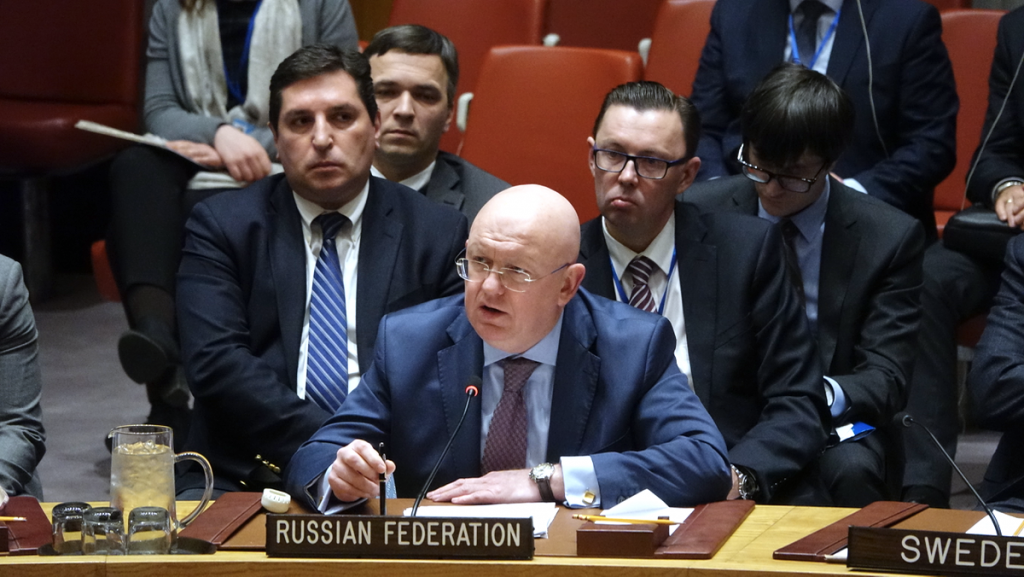Statement by Ambassador Vassily A. Nebenzia, Permanent Representative of the Russian Federation to the United Nations, before the vote on the Security Council resolution on sanctions against Yemen
The Russian Federation will not be able to support draft resolution S/2018/156, proposed by our British colleagues, on the extension of the mandate of the Panel of Experts of the Security Council Committee established pursuant to paragraph 19 of resolution 2140 (2014) on sanctions against Yemen, but we do not want any misunderstanding in that regard.
While we fully endorse the majority of the draft resolution’s provisions, we cannot concur with its unconfirmed conclusions and evidence, which will require verification and discussion by the Sanctions Committee. We agree with extending the embargo, and we did everything we could to achieve adoption of the draft resolution today, without proposing even a single compromise on the wording. Unfortunately, however, we were unable to get there.
We are generally in principle against a politicized approach to the technical rollover of the Sanctions Committee’s Panel of Experts, one whereby their assistance is used to decide neither technical nor expertise issues but geopolitical ones, at a time when the situation in Yemen is far more complicated than the frequent attempts to lead us to believe otherwise would have it. Incidentally, we spoke about the importance of continuing such expert work just three days ago, when the Russian Federation sent a request to the Secretariat to clarify certain details regarding the use of arms in Yemen to which we have not yet had an answer.
During the expert consultations we — and we were not the only ones — clearly explained our disagreement with a number of provisions in the draft resolution based on selective and contentious conclusions of the Panel of Experts. I should point out that during the discussion of the final report of the Sanctions Committee, there was no consensus-based approach.
We tried to convey to our colleagues that assessing the conclusions of the Panel of Experts before the 2140 Committee has formulated a final evaluation of them is wrong and premature. Unfortunately, our concerns, which we know are shared by many delegations, were disregarded.
Voting on a draft resolution that does not have the approval of all of its members divides the Security Council at a time when it desperately needs unity. To be blunt, the wording of the draft resolution proposed by the United Kingdom could have seriously destabilizing consequences, not just for the situation in Yemen but for the entire region, which would inevitably escalate regional tensions and opposition among key players.
We have frequently said that we see a grave danger in playing fast and loose with geopolitical cards, and that includes the highly volatile relations between Sunni and Shiite within the Islamic world. Rather than making relations in the Middle East more antagonistic, we should be taking steps aimed at reaching agreement through mutually respectful dialogue.
We have repeatedly proposed an alternative and viable plan for united action that assumes that the focus should be, not on sanctions or pressure, but on genuinely concerted efforts to seek ways to resolve crisis situations. We should begin by coming up with ways to launch a dialogue. The Russian Federation previously proposed an initiative for starting inclusive regional discussions on confidence- and security-building in the region of the Persian Gulf.
The course of events has shown that such a format would be valuable for the entire Middle Eastern region as well. Security should be reciprocal, regional and indivisible. We should also point out that the potential of resolution 598 (1987) is still unrealized. It directs the Secretary-General to work collaboratively with all interested parties to devise an architecture for security in the region. In order to avoid undermining the Security Council’s unity, its resolutions should be unpolitical and predominantly technical in nature. We support extending the mandate of the Panel of Experts.
However, provisions that can potentially lead to action under Chapter VII of the Charter of the United Nations must be rooted in verified facts. The Committee should be given more information, and in that regard the Panel’s work should continue. As an alternative, therefore, we propose adopting a technical draft resolution on extending the mandate of the Panel of Experts of the Sanctions Committee for Yemen that we request be put to a vote today.
